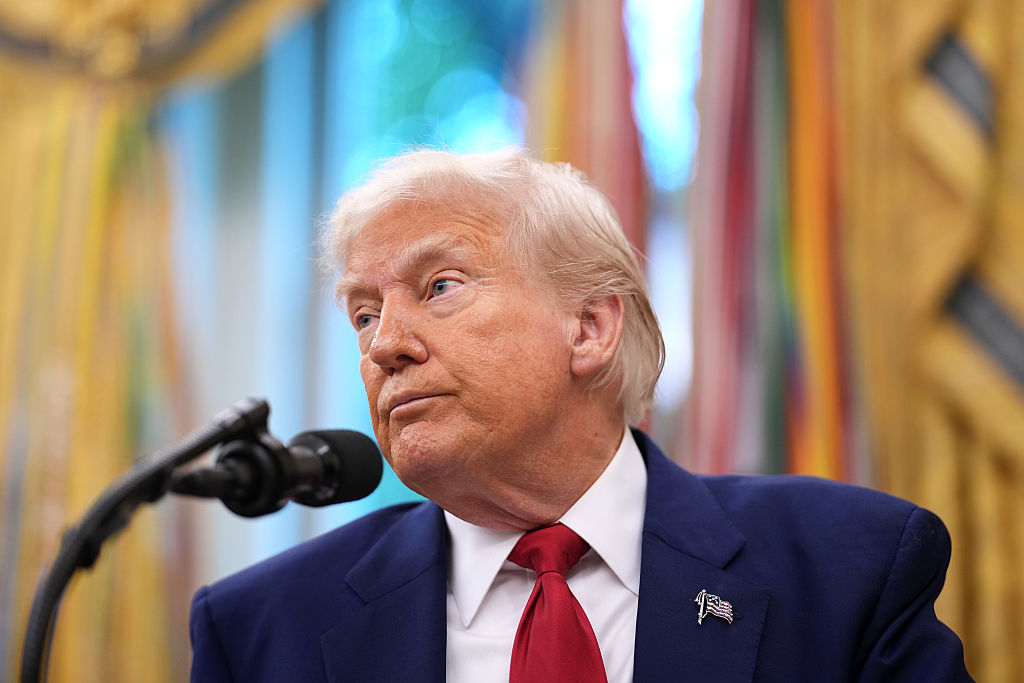President Donald Trump’s pardoning blitz has dominated the headlines with reality-TV stars, a rapper and political allies all walking free from prison after he granted them clemency.
But quietly in the office of the Justice Department’s pardon attorney – where all of the above appeals were processed – a much more significant and wide-reaching process of forgiveness is taking shape.
Ed Martin, Trump loyalist and new pardon attorney, is preparing his team to review applications from people – a lot of people – with criminal convictions to have their gun rights restored.
“The pardon staff has already been working at it, because we anticipate hundreds and hundreds of thousands of applicants,” Martin told the Wall Street Journal.
Since 1992, the review process for gun rights to be returned to those with criminal convictions has been dormant. The Bureau of Alcohol, Tobacco, Firearms and Explosives (ATF) can return those rights, but congressional spending bills have blocked the agency from acting on applications.
When the review process was first stalled, Congress noted the challenges of determining whether an applicant posed a danger to public safety and voiced concern about the number of people, cited in a Violence Policy Center report, who went on to commit new crimes.
But the National Rifle Association (NRA) said the real reason was “due to concerns over the [number] of resources ATF was diverting from its other law enforcement and regulatory programs to process the petitions, as well as lobbying by anti-gun groups, who claimed that restorations endangered public safety.”
That means that President Trump himself, the nation’s Commander-in Chief, is not allowed to own a gun – and can’t appeal – because he was convicted on 34 felony counts.
Now, Trump is bringing the application program back through a workaround that defies Congress. He has withdrawn the ATF’s authority to review applications and granting it instead to the Attorney General – and the AG has put Ed Martin in charge of reviewing applications.
Federal law prohibits 13 categories of people from possessing firearms – including nonviolent felons, people convicted of misdemeanor domestic violence and anyone convicted of a crime punishable by imprisonment for a term exceeding one year.
The law, notes Reason, does not take into account if the sentence were actually imposed, whether the offense involved violence or how long ago it happened.
Melynda Vincent, for instance, lost her right to own a gun for trying to cash a bad check in the amount of $498.12. She was convicted of a felony in 2008, and in 2023, Vincent’s attorney petitioned the US Supreme Court to get her gun rights back, arguing, “She has no history of violent behavior or other conduct that suggests she could not responsibly possess a firearm for self-defense. And for more than 15 years, she has been a law-abiding citizen.”
Bryan Range was banned for life from owning a gun because in 1995, when he was struggling to feed his family, he lied on a form so he would be eligible for food stamps. In 2023, the US Court of Appeals for the Third Circuit ruled in Range v. Garland that stripping Range of his Second Amendment rights was unconstitutional.
Larry Hatfield pled guilty in 1989 to making false statements on a Railroad Retirement Board form. Since the Board is part of a federal agency, Hatfield was convicted of a felony and stripped of his gun rights, though he did not serve prison time.
Gun rights advocates have been making the point for years that if a citizen is considered safe enough to be out and about in society, i.e. not locked behind bars, that person should also be able to exercise the rights enshrined in the Constitution, including the right to keep and bear arms. As for the repeat offenders referenced in the Violence Policy Report, NRA analysis found most of the offenses “had nothing to do with firearms.” What’s more:
Some offenses bordered on the comical, including operating an illegal still, illegal interstate sale of deer antlers, failure to disclose tips on a tax return, theft of $100 worth of soap powder, “grand larceny of a cow,” theft of an air conditioner, and filing a “false report with the Department of Agriculture concerning the collection of blood samples from a herd of pregnant dairy cattle being exported to Taiwan.”
Even the Washington Post acknowledged, “With the Second Amendment’s robust protections of individual gun ownership, there is no good reason to permanently prohibit individuals who have no heightened likelihood of violence from purchasing or possessing firearms.”
Actor Mel Gibson – one of Trump’s special ambassadors to Hollywood – has been one of the first high-profile people to have his gun rights restored. Gibson was convicted in 2011 of misdemeanor domestic violence against his then-girlfriend in a case that involved the leaking of a scandalous-sounding recording of Gibson berating his ex. Gibson maintains the recording was edited and “only reflected one terribly, awful moment in time.” Former pardon attorney Liz Oyer refused to add Gibson to the list for consideration, telling Congress she would not, “based on concerns about public safety.” Oyer now claims she was fired for refusing to help Trump’s “famous friend.”
Clearly, there is a difference between allowing a criminal with a history of violence from possessing a firearm and reinstating Second Amendment rights – or never having them taken away in the first place – to people who committed non-violent offenses and who pose no obvious threat to society. Whether logic wins out for hundred of thousands of citizens seeking to exercise their right to self-defense is now the purview of Ed Martin.


























Leave a Reply